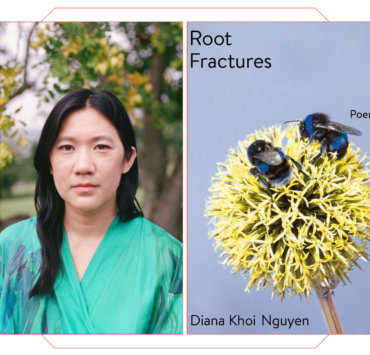
I am teaching myself translation. Not to translate, but to better understand what it means to live between languages. To live inside and outside of them. It is my latest obsession.
I was born in the Netherlands to a Colombian mother and a German father. I grew up in Spanish, English, German, and Dutch—I lost the latter when we moved from the Netherlands to the States. When a writer I meet tells me the prophetic calling of her first word, book, I marvel at this origin story, then wonder, in what language did I first speak?
Spanish is my mother tongue and my mother’s tongue. When asked if I am fluent in Spanish, I answer, fluency is a spectrum. This is true, but what I mean to say is that I can live a life in Spanish: I can open a bank account and rent an apartment and go on long walks in the mountains with a friend, but I probably read at the fourth grade level; I tremble and trip and lose all my words when I am nervous; I forget realizar does not mean to realize. I can live a life in Spanish, yes, but I cannot live my English life in Spanish.
* * *
As an undergrad, I fell in love with Jhumpa Lahiri; I fell in love with nostalgia and exile and questions of belonging. Lahiri, born in London to Indian immigrants, moved to Rhode Island at the age of three. She grew up watching her parents mourn their language, Bengali. This was before the instant-ness of the internet, before we could so easily reach and retrace, a time when her parents gripped onto letters in their language, reread what their beloveds had said again and again for a flicker of proximity. It is complicated, Lahiri’s relationship to Bengali. It is a language she cannot read or write in. A language that, despite trying all her girlhood, she cannot speak without a foreign accent. She wanted to be both completely [her parents’] daughter and considered an American, but could be neither. Bengali, Lahiri explains, is both her mother tongue and a foreign tongue.
In Beyond the Mother Tongue, Yasemin Yildiz explores how the monolingual paradigm shapes the discourse on multilingualism, where ‘mother tongue’ creates constraint. She argues:
The “mother tongue” functions as a shorthand that barely need explication. In this shorthand, the weight of the argument falls on the element of “mother” in Muttersprache. It stands for a unique, irreplaceable, unchangeable biological origin that situates the individual automatically in a kinship network and by extension in the nation.
Later, she writes:
The notion of the unique “mother” insists on one predetermined and socially sanctioned language as the single locus of affect and attachment and thus attempts to obscure the possibility that languages other than the first or even primary one can take on emotional meaning.
How does our relationship to language change when we think beyond its ties to ethnicity and nationality?
For this, I am fascinated by Jhumpa Lahiri’s move into Italian—a language she studied for many years ‘in exile’, away from its roots, before moving to Rome. Of her voyage across the Atlantic, Lahiri writes: it will be the first true departure of my life. I wonder if she would also call it a departure from her life. A move that marks a previous life, and a new one.
There is a tenderness in the way she writes about Italian: It’s like a person met one day by chance, with whom I immediately feel a connection, of whom I feel fond. She is in love, she says, it is a doting relationship, one of magical intimacy—yet it is unrequited. The language will never need me.
Need catches me. Can language need us? Is it not people, place, and circumstance that gives language need? Or can we offer a new language something it needs? Can we give it translations?
* * *
As I walk across campus with my new librarian friend, I tell her about my latest reading—a study on the varying translations of Wang Wei’s “Deer Park”. Eliot Weinberger describes two kinds of Chinese translators: there are scholars: most are incapable of writing poetry, but a few can… And there are poets: most know no Chinese, a few some. I mention my horror at approaching a translation of a poem I couldn’t read, but Weinberger observes how translations by poets, rather than scholars, better understand the poem. My friend offers another framework: in the world of library science, this is a question of accuracy and aboutness. The poets, she says, may be better at approaching aboutness.
I am interested in the phrase ‘approaching aboutness’. Not arrival, not delivery, but nearing.
Kate Briggs, in A Little Art, captures this nearing:
We need translations, urgently: it is through translation that we are able to reach the literatures written in the languages we don’t or can’t read, from the places where we don’t or can’t live, offering us a chance of understanding as well as the necessary and instructive experience of failing to understand them, of being confused and challenged by them.
We are reaching, trying, and failing at a chance of understanding.
* * *
There are Spanish words I did not know existed in English. Caspa. Lunar. There are Spanish words that do not exist in English: Estrenar, Sobremesa, Tutear. For so long I thought caspa was a condition only my sisters and I, and the other kids at the Mexican grocery store, suffered from. Our Head & Shoulders commercials came in Spanish. The models always had brown hair and skin. They promised us no more salty scalps. Teased us with luscious long hair. In high school I learned others knew of this thing that flaked from our heads. Dandruff! Dandruff! The thrill of finding a new word, as ugly as it might be.
Lunar has a translation, but I have always hated the word mole. Mole, for me, carried stigma. It is an unearthed rodent. A thing that comes with stray long hairs and requires surgical removal. Not lunares, no, my sisters and I made constellations of the brown dots along our body. My mother poked my sister’s back, Did you know your tío Vicente has one right there? And your tía Ana too. And right here, she’d press into our skin, your Abuelo had one, too. Our lunares carried our lineage. We wanted to know whose little moons we had inherited.
* * *
In an interview with Paul Holdengräber, Jhumpa Lahiri recalls a wallet she gifted her mother. Inside the wallet’s photo pocket, Lahiri slipped a picture of the building in Kolkata where her mother grew up. This place, Lahiri describes, was her mother’s Ithaca, her everything, the place where she was happy. It is also the place Lahiri has always stood outside of. Her parent’s language, their home, a planet she mooned. Preserved behind a thin piece of plastic film, Lahiri gifted her mother a pocket homage to the center of her mother’s happiness. Imagine, to reach into your pocket and touch plastic, and not the cement and dust of home. A haunting proximity.
In a letter to Fawwaz Traboulsi, Etel Adnan writes of chasing her mother’s voice: I went to Greece hoping to hear the Greek spoken by my mother. I listened closely, and it seemed that no one spoke the way she did.
I chase my mother’s Spanish too. I have lost her and fear losing the language that celebrated my first wobbly steps. I catch it rarely, the mountain sounds of my mother’s Colombia. My monthly calls with her sister, my aunt, are not enough. We are all retracing our mothers—the piece of them we cannot have; a home we cannot belong to.
For a year I lived in Asturias, Spain, to meet my Spanish self. Of course, no one there spoke the way she did. I found it disorienting, at first, to live in the Europe of my father, but in the language of my mother. But then, it became a place that was untethered to them. My mountain and my cows and my café con leche. Not my as in ownership or as in belonging to me, but my as in denoting relation, a friendship perhaps, one that felt so separate from my parents.
* * *
At the age of four, I moved from the Netherlands to the cornfields of Illinois. I lost my Dutch soon after, but for a period of my childhood, I forgot that I ever knew the language. I told my father of the made-up language I spoke in daycare, amazed how despite speaking in gibberish, my friend and I understood each other completely.
Dutch, my father said, you were speaking Dutch.
In memory, I had made the language alien.
My father woke my sisters and I every Sunday morning with his German. His voice, the only bridge across the Atlantic. I learned to sleep through shouted German. And while I tried many times, I have never learned the language. At eleven, I figured out how to say my age. Ich bin elf jahre alt. I was eleven for many years. In grad school, I audited half a semester of German until I grew embarrassed to be so much slower than the eighteen year-olds who had also studied the language in high school. A shame.
Ich bin sechsundzwanzig jahre alt. I am twenty-six years old.
Ich bin Kolumbianerin. Ich bin Deutsche. Ich studiere Literatur.
I don’t feel towards German what I feel towards Spanish. There’s no grief wrapped up in it. There is something about the disappearing of the mother tongue when you live outside of it—a unique distance that no other language acquisition can know. This grief is the emotional attachment I think we talk about when we talk about our first language(s).
* * *
When I visit my father’s house, I find the baby book my mother made where she documented my first word: Quac Quac. She writes it half in Spanish, half English.
Quack
Cuac
Perhaps my first language is bird. A language of flight, of migration. An in-between. A translation.
* * *
Kate Briggs thoughtfully imagines translation as ‘a table’ and ‘to table’, as in to submit for consideration, to propose, as well as to suspend consideration indefinitely. It is also, etymologically, a plate, a meal, an offering. Or alternatively, the thinking itself and the configuration of persons and relations around it.
It is a commitment to togetherness, to uncertainty, to relation and limbo at once.
In Jessica Gaitán Johannesson’s debut novel, How We are Translated, a Swedish woman named Kristin contemplates her pregnancy while working at a museum in Edinburgh, where she role-plays as a Viking. While working, Kristin is only permitted to speak in Swedish. Before each shift she must spend twenty minutes in the ‘Translation Room’, where the actors must leave [their] English-speaking everydays tidily outside, and return to their native language. The Translation Room’s intended function is a place of meditation and renunciation, but our narrator is incapable of tidy abandon. Her English and Swedish cannot be compartmentalized into two lives. She is always living in the Translation Room.
In murky preparation for the potential baby, Kristin’s partner begins to learn Swedish. Kristin presses to know more about his childhood. Adopted by a Scottish family at a young age, he remembers little from his life in Brazil. She asks about the voyage, about his adopted mother. You get on the plane, and then you get off, and at some point she becomes ma, she says. She is getting at a question of intimacy: when did you call that woman who picked you up in the airport, Mom? How does someone else become your mother? Or what Johannesson is really asking, how do we relate to our adopted tongues? Who does language tie us to?
* * *
Our estrangement to our first language(s) shapes our relationship to language itself. It is a ghost tongue in the cave of our mouths. Bengali will be taken away when my parents are no longer here, Lahiri writes. It is the language that formed her relationship to language—one of linguistic exile. It is what she admires of Italo Calvino, his ability to straddle places and languages…acutely aware of what could be mined from a detachment from one’s own origins. Italian is Lahiri’s bridge to another planet, a moon tugged elsewhere. It offers Lahiri a new way of being inside and outside of something, the way she has always looked at language, a new margin to make home.
* * * * *
Works Referenced
Adnan, Etel. Of Cities & Women: Letters to Fawwaz. Post-Apollo Press, 1993.
Briggs, Kate. This Little Art. Fitzcarraldo Editions, 2021.
Holdengräber, Paul, and Jhumpa Lahiri. “My Mother’s Nostalgia.” Youtube.com, New York Public Library, 4 Mar. 2016.
Johannesson, Jessica Gaitan. How We Are Translated. Scribe, 2022.
Lahiri, Jhumpa. Translating Myself and Others. Princeton University Press, 2022.
Lahiri, Jhumpa, and Ann Goldstein. In Other Words. Bloomsbury, 2017.
Weinberger, Eliot, and Octavio Paz. 19 Ways of Looking at Wang Wei: With More Ways. New Directions Books, 2016.
Yildiz, Yasemin. Beyond the Mother Tongue: The Postmonolingual Condition. Fordham Univ. Press, 2014.
Catalina Bode is a writer and educator mostly from Illinois and now lives in Ohio. Her work has been supported by a Fulbright, Tin House, the Vermont Studio Center, the Wexner Center for the Arts, the Hopwood Program, the Greater Columbus Arts Council, and as a Ricardo Salinas Scholar. She earned her MFA from the Helen Zell Writers’ Program at the University of Michigan and her writing can be found in Alaska Quarterly Review, The Pinch, and Salt Hill Journal.







